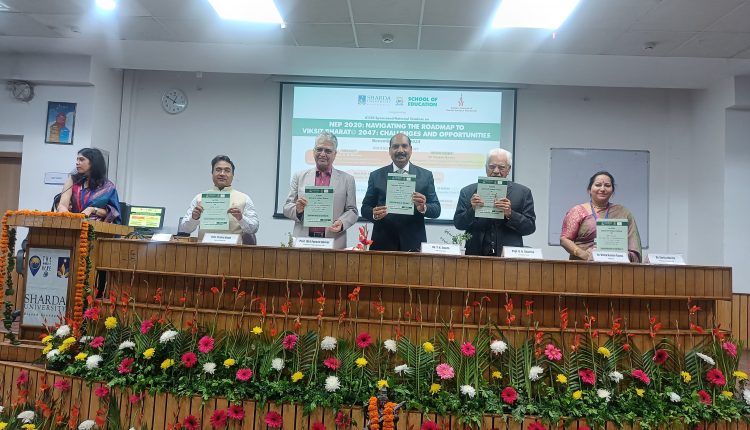Sharda University hosts Conference on NEP 2020, Experts Discuss Transformative Vision for India’s Development
TEN NEWS NETWORK
The School of Education at Sharda University, Greater Noida, in collaboration with the Indian Council of Social Science Research (ICSSR), organized a three-day national seminar on the National Education Policy (NEP) 2020. The event witnessed the participation of over 300 individuals from across India and featured expert discussions on the transformative potential of NEP 2020 in shaping India’s future.
In his address to the participants, Prof. Furqan Qamar, Professor at the Centre for Management Studies, Jamia Millia Islamia, emphasized the NEP’s role in fostering a multidisciplinary, flexible, and student-centric education system. He noted that the policy aims to nurture scientific temper, intellectual curiosity, and innovation among students, equipping them with expertise in their chosen fields.
Speaking to Ten News, Prof. Qamar elaborated on making India a hub for research and innovation under the vision of Viksit Bharat. He highlighted the importance of research-based teaching, robust infrastructure, and bridging existing gaps to achieve this goal. He cautioned that while technology enhances education quality, it cannot replace teachers, emphasizing the indispensable role of educators in guiding students and fostering critical thinking.
Prof. G.D. Sharma, Chairman of SEED and former UGC Secretary, described NEP as a paradigm shift from general curricula to discipline-specific courses, providing opportunities for students to pursue honors and research qualifications. Addressing participants, he highlighted the meticulous design of the NEP Curriculum Framework 2023, which emphasizes rigorous disciplinary approaches suited to students’ comprehension levels.
In his interaction with Ten News, Prof. Sharma underscored the role of technology in improving education accessibility and quality. He advocated for using virtual universities and digital tools to reach larger audiences, emphasizing the need for teachers to adapt to emerging technologies. “Faculty members must familiarize themselves with cutting-edge tools to ensure effective teaching, research, and innovation,” he added, cautioning against the potential misuse of technology.
Prof. Y.K. Gupta, Pro-Chancellor of Sharda University, highlighted the conference’s objective of aligning educational institutions with the Prime Minister’s vision of India as a developed nation by 2047. Addressing the participants, he spoke about the university’s commitment to reducing dropout rates, improving gender equality, and promoting interdisciplinary education to uplift underserved populations.
Speaking to Ten News, Prof. Gupta shared insights into the university’s adoption of NEP parameters, stating, “The dynamic changes introduced by NEP 2020 will help create a developed nation. Through this conference, we aim to equip students with the skills to tackle challenges and contribute to India’s development.”
The conference served as a platform for discussions on innovation and research. Prof. Sharma emphasized that innovation starts with an idea aimed at meaningful change, requiring rigorous thinking and dedication. Both experts stressed the importance of leveraging technology while preserving the human touch in education, with teachers remaining pivotal in guiding students to utilize technology responsibly.
Participants engaged in sessions designed to inspire critical thinking and prepare them to address the country’s challenges. As Prof. Qamar advised students, “Focus on what you learn rather than just grades. Develop skills, think critically, and continuously adapt to the rapidly changing world.”
The seminar concluded with a renewed commitment to the NEP 2020 vision of making India a global hub for research, innovation, and quality education. Experts and participants alike left with a shared goal: to contribute to India’s journey toward becoming a developed nation by 2047.


